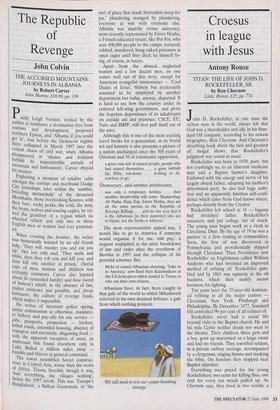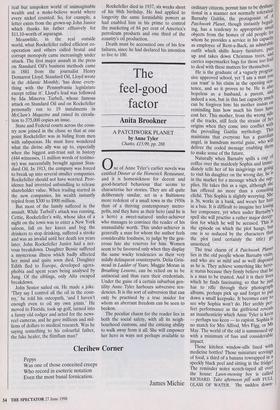Croesus in league with Jesus
Antony Rouse
TITAN: THE LIFE OF JOHN D. ROCKEFELLER, SR by Ron Chernow Little, Brown, £25, pp. 774 John D. Rockefeller, at one time the richest man in the world, always felt that God was a shareholder and ally in his Stan- dard Oil company, according to his newest biographer, Ron Chernow. And Chernow's absorbing book about the first and greatest oil mogul shows that Rockefeller's judgment was sound as usual.
Rockefeller was born in 1839, poor, but not crushingly so, to an itinerant medicine man and a Baptist farmer's daughter. Endowed with the energy and nerve of his largely absent father, adopting his mother's determined piety, he also had huge ambi- tion and an apparently limitless self-confi- dence which came from God knows where, perhaps directly from the Creator.
Rockefeller left school at 16 — bigamy had stretched father Rockefeller's resources and put college out of reach. The young man began work as a clerk in Cleveland, Ohio. By the age of 19 he was a partner in a firm trading in commodities. Soon, the first oil was discovered in Pennsylvania and providentially shipped through Cleveland. Then Providence sent Rockefeller an Englishman called William Andrews who had invented an improved method of refining oil. Rockefeller gam- bled and by 1863 was squarely in the oil business, which then mostly meant kerosene for lighting.
Ten years later the 35-year-old dominat- ed refining in all the major centres — Cleveland, New York, Pittsburgh and Philadelphia. By December 1877, Standard Oil controlled 90 per cent of all refined oil.
Rockefeller never had a social life beyond visits to the Baptist church. He and his wife Cettie neither drank nor went to the theatre. Their children, three girls and a boy, grew up marooned on a large estate and had no friends. They travelled seldom, in a private railway carriage, accompanied by a clergyman, singing hymns and studying the bible. On Sundays they stopped near Baptist churches.
Everything was prided for the young Rockefellers; two cents for killing flies, one cent for every ten weeds pulled up. As Chernow says, they lived in two worlds, a real but unspoken world of unimaginable wealth and a make-believe world where every nickel counted. So, for example, a letter exists from the grown-up John Junior which thanks his father effusively for $11.10-worth of asparagus.
Meanwhile, in the real outside world, what Rockefeller called efficient co- operation and others called brutal and corrupt monopoly came increasingly under attack. The first major assault in the press on Standard Oil's business methods came in 1881 from the journalist Henry Demarest Lloyd. Standard Oil, Lloyd wrote in the Atlantic Monthly, 'has done every- thing with the Pennsylvania legislature except refine it'. Lloyd's lead was followed by Ida Minerva Tarbell, whose famous attack on Standard Oil and on Rockefeller personally ran to 19 instalments in McClure's Magazine and raised its circula- tion to 375,000 copies an issue.
State and Federal courts across the coun- try now joined in the chase so that at one point Rockefeller was in hiding from men with subpoenas. He must have wondered what the divine ally was up to, especially when the biggest anti-trust suit in history (444 witnesses, 11 million words of testimo- ny) was successfully brought against Stan- dard Oil. In 1913, the company was forced to break up into several smaller companies. Rockefeller should not have worried. Prov- idence had invented unbundling to release shareholder value. When trading started in the new companies, his wealth instantly tripled from $300 to $900 million. But most of the family suffered in the assault. While Tarbell's attack was running, Cettie, Rockefeller's wife, whose idea of a night on the town was to enter a New York saloon, fall on her knees and beg the drinkers to stop drinking, suffered a stroke and was an invalid until her death ten years later. John Rockefeller Junior had a ner- vous breakdown. Daughter Bessie suffered a mysterious illness which badly affected her mind and quite soon died. Daughter Edith fled to Europe, developed agora- phobia and spent years being analysed by Jung. Of the siblings, only Alta escaped breakdown.
John Senior sailed on. He made a joke. `They say I control all the oil in the coun- try,' he told his osteopath, 'and I haven't enough even to oil my own joints.' He moved to Florida, took up golf, turned into a funny old codger and acted for the news- reel cameras, and he gave millions and mil- lions of dollars to medical research. Was he saying something to his colourful father, the fake healer, the flimflam man? Rockefeller died in 1937, six weeks short of his 98th birthday. He had applied to longevity the same formidable powers as had enabled him in his prime to control the marketing of 84 per cent of America's petroleum products and one third of the country's oil production.
Death must be accounted one of his few failures, since he had declared his intention to live to 100.



























































 Previous page
Previous page